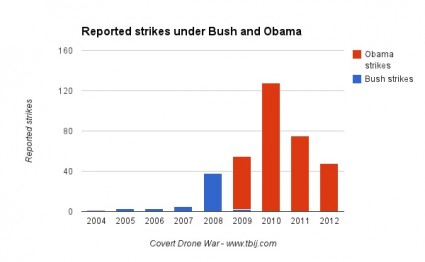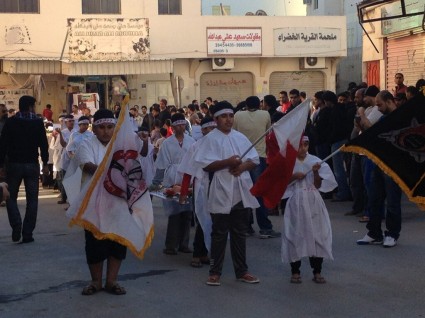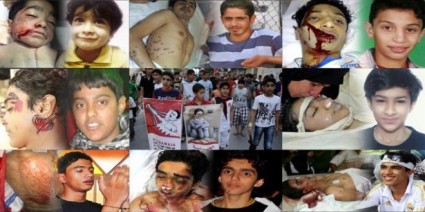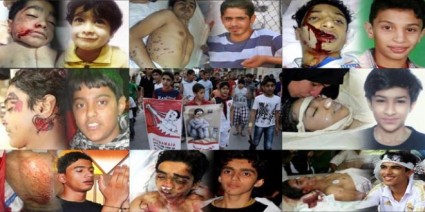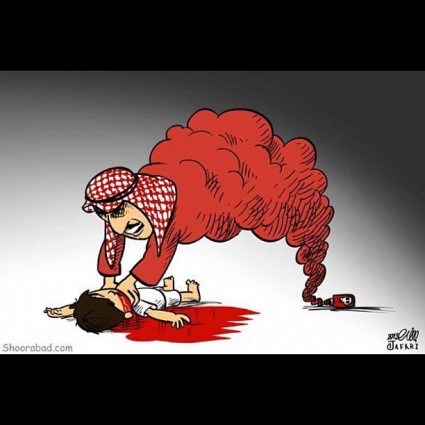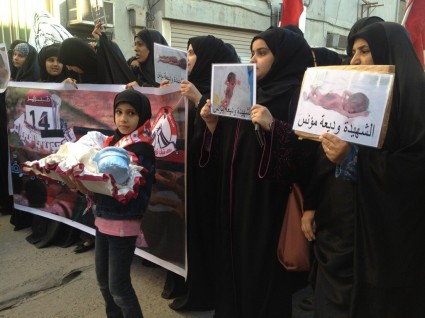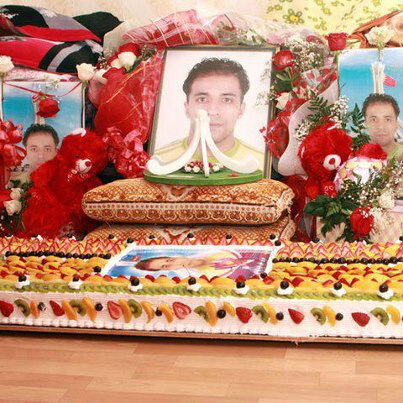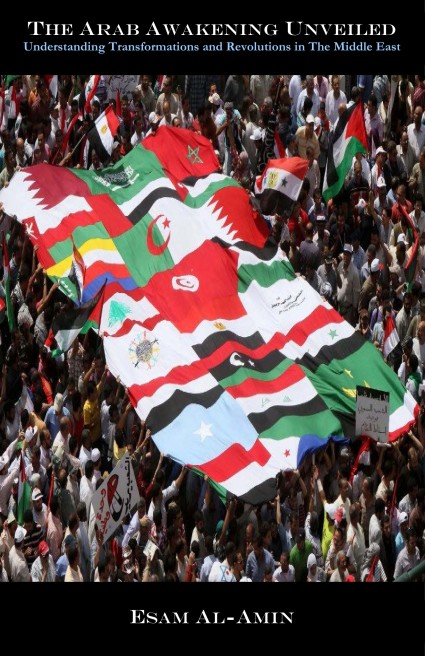Child Murder becomes routine for US Drone Commander and Chief
The Children Killed by America’s Drones. “Crimes Against Humanity” committed by Barack H. Obama.
By Michel Chossudovsky – Global Research – 26 January, 2013
This is a list of names of innocent children killed by America’s drones
But behind each name there is the face of a child with a family history in a village in a far away country, with a mom and a dad, with brothers and sisters and friends.
Among the list, are infants of 1, 2, 3 and 4 years old.
In some cases brothers and sisters of an entire family are killed.
Four sisters of the Ali Mohammed Nasser family in Yemen were killed. Afrah was 9 years old when she and her three younger sisters Zayda (7 years old) , Hoda (5 years old) and Sheika (4 years old) were struck by an American drone.
Ibrahim, a 13 year old boy of the Abdullah Mokbel Salem Louqye family in Yemen was struck by a US drone, together with his younger brother Asmaa (9 years old) and two younger sisters, Salma (4 years old) and Fatima (3 years old)
These children are innocent. They are not different from our own children.
Their lives were taken away at a very young age as part of a military agenda, which claims to be combating “international terrorism”
These drone attacks are extremely precise. We are not dealing with “collateral damage”.
Drone operators have the ability of viewing from a computer screen their targets well in advance of a strike.
A family home is referred to as a “structure” or a “building” rather than a house. When they target a home with family members, they kill children. And they know that in advance of the drone strike:
“Bryant saw a flash on the screen: the explosion. Parts of the building collapsed. The child had disappeared. Bryant had a sick feeling in his stomach.
“Did we just kill a kid?” he asked the man sitting next to him.
“Yeah, I guess that was a kid,” the pilot replied.
“Was that a kid?” they wrote into a chat window on the monitor.” (The Woes of an American Drone Operator, Spiegel.de, December 14, 2012)
These children were killed on the orders of the US President and Commander in Chief Barack H. Obama.
The commander in chief sets the military agenda and authorizes these killings to proceed.
The killings were quite deliberate. They are categorized as “crimes against humanity” under international law.
Those who ordered these drone killings, including the president of the United States, are war criminals under international law and must be indicted and prosecuted
It should be noted that the drone attacks on civilians have increased dramatically during the Obama presidency:
February 5, 2013 Add Comments
Bahrain Kids Protest Security Force Murders of Infants, their Siblings and Friends
February 5, 2013 Add Comments
Extereme Sentences for Dissent in Saudi Arabia parallel those in Bahrain
Saudi Arabia: 36 Days in Jail for Human Rights Sign
31 January, 2013 – FARS
TEHRAN (FNA)- Saudi Arabia’s harsh crackdown on demonstrations led many to start experimenting with new methods for showing dissent.
A public hunger strike was one example. In a series of tweets, Saudi Twitter user Mohammad al-Olayan told his own story of writing a human rights sign, namely “No to arbitrary detainment,” on his car, Global voices reported.
“On Sunday December 16th, I was arrested by emergency forces on my way back from work because of a “No to arbitrary detainment” sign on my car’s rear glass. I was transferred to al-Manar police (station) after my car had been photographed,” al-Olayan said on Twitter.
“A policeman started the interrogation and I denied responsibility. I told them that I had found the writing at dawn when I was about to leave to work and I couldn’t remove it because the ink was irremovable. I affirmed my statements with a fingerprint and I asked the policeman to allow me to leave even if this requires a third person since I did not commit any crime and did not violate any law, but he refused and told me that I am under detainment for interrogation.
“Then a policeman asked me to hand my mobile phone and my keys and took me to a very, very crowded communal cell with inhumane conditions. The policemen told me (to stop talking about humanity and get in,) but I refused to do so. He then took me to a solitary confinement cell, but it was leaking and full of dirt so I refused to get in so he took me to a hallway and said that no place left but this one I told him that this was a better place, so he tied me to an iron door then they took me to the communal cell at dawn (…)”
Al-Olayan continued by reporting further interrogation in which he was asked whether he had attended the public trial of two of Saudi Political and Civil Rights Association’s (ACPRA) co-founders. ACPRA found out about his arrest so they asked a volunteer lawyer to help him.
Al-Olayan was finally sent to court and he continued to deny responsibility. The judge issued an order to release him, after 36 days, on the condition of attending further sessions if he was ever called. …source
February 5, 2013 Add Comments
Celebration for release of unjustly detained Aqil Abdul Mohsen
February 5, 2013 Add Comments
Renewed Calls for Bahrain Regime to lift Ban and Stop Attacking Peaceful Potest
Bahrain: the regime must halt the persistent security repression to the peaceful demonstrations
ANHRI – 2 February, 2013
The Arabic Network for Human Rights Information (ANHRI), denounces today the use of the excessive force in dealing with the peaceful demonstrations that took place in several places in Bahrain to call for political and social reforms in the country and to solidarity with the detainees.
Bahrain security forces used the tear gas bombs and shut gun to deal with the peaceful demonstrations which took place in Friday February 1, to call for political reformations in addition to assure the continuation of the popular movement and persistence on the demands of the Bahrain revolution which will have its third anniversary after days. The security forces repressed the demonstrations which took place in Akr, Kranah, Gamarah, Sadd and Gad Hafs, which resulted in several injuries among the demonstrators and the news reported regarding the arrest of demonstrators.
The opposition forces announced series of protesting in conjunction with the second anniversary ofthe Bahraini uprising on February 14, 2011. The events include people’s demonstrations, celeberations and marches in differnet areas which include “Manama” which entitled “calls for the revolution”, which will start in the first of February 2013 until 16 February, it also included 48 of revolutionary events, marches and opposition movements to assure the presistence of the revolution in Bahrain and call for the democractic transformation such as the masses marches, which entitled differnetly, and people meetings, protests and marches in the heart of Manama.
ANHRI said that “the persistence of using excessive violence by the authorities to address the peaceful demonstrations of the people and prosecuting the activists, oppositions and harassing them, are attempts from the regime to infanticide the popular movement which calls for freedom and democracy”.
ANHRI said that “the persistence of the repressive policies of the regime, will end any attempt to negotiate and discussion between the opposition and the regime”.
ANHRI calls on Bahrain to respect the freedom of expression and peaceful demonstration which are legitimate to the individuals and citizens and garunteed by all the international treaties and charters. …source
February 5, 2013 Add Comments
Bahrain Two Years On – King’s Chardes, Shenanigans and Pretense of “Reform” Sharpen the call to Revolution
Bahrain’s 2-year-old uprising at crossroads: Offers to talk and calls for greater rebellion
By Associated Press – 4 February, 2013 – Washington Post
MANAMA, Bahrain — Young men wearing masks lurk in the darkened alcoves of the old market in Bahrain’s capital. “To victory,” they whisper as they hand out pamphlets calling for greater rebellion after two years of nonstop unrest in the Gulf kingdom.
In another part of the city, leaders of established Shiite opposition groups study their next moves. One option is to open talks with the Sunni monarchy as a possible soft landing from the Arab Spring’s longest-running uprising against a sitting power.
The two faces of Bahrain’s tumult have never been clearer as the struggles in the strategic island — home to the U.S. Navy’s 5th Fleet— mark their second year next week.
The old guard Shiite political factions appear worn down by the ceaseless tensions and seem increasingly open to some kind of face-saving compromise with Bahrain’s Sunni leadership. Such negotiations are endorsed by Washington and other Western allies of Bahrain’s ruling dynasty.
On Monday, Bahrain’s justice minister, Khaled bin Ali Al Khalifa, said preliminary political talks are scheduled to begin Feb. 10 — just days before the second anniversary of the crisis. The official Bahrain News Agency called it an important step toward “national consensus.”
But the clashes and bloodshed also have elevated another voice from Bahrain’s streets: A shadowy network of youth groups and hard-line Shiites — knitted together by social media — that have coalesced around an angry axis. Calls to bring down the monarchy are now staples in the near daily skirmishes with security forces.
“No to dialogue! No to surrender!” several hundred protesters chanted during a recent confrontation between demonstrators with firebombs and riot police responding with tear gas and stun grenades.
It might seem like a worrisome groundswell for Bahrain’s Sunni rulers, who have managed to keep a close grip on power for decades under what critics call a two-tier system. The majority Shiites, about 70 percent of the population, claim they are relegated to the lower rungs with limited say in the country’s affairs.
Bahrain’s uprising seeks to tilt the scales toward the Shiites. But divides within the Shiite population — whether to battle harder or open talks — could end up giving Bahrain’s rulers more breathing space. If the main Shiite factions can be brought into negotiations, the opposition left on the streets would continue as an annoyance to the monarchy but less of a potential threat to their power.
“The confrontational elements in Bahrain — those who have effectively rejected dialogue as pointless — are certainty taking more charge of the tone on the streets,” said Toby Jones, an expert on Bahraini affairs at Rutgers University. “It invites a type of comparison to the 50s and 60s civil rights movement when activists had to be provocative enough to provoke police backlash and brutality and the cycle goes on.”
It’s not hard to lose track of little Bahrain on the greater Arab Spring stage.
Bahrain’s two-year death toll of more than 55 was exceeded in a single day in Syria. There is no clear center of gravity in Bahrain’s uprising like Egypt’s Tahrir Square. Bahrain’s protest hub of Pearl Square was cleared by police raids in the early weeks of the unrest and now is ringed round-the-clock by security forces, razor wire and concrete barricades. …more
February 5, 2013 Add Comments
Bahrain Political Prisoners in Hunger Strike against torture and abuse behind bars
Four prisoners began a dry hunger strike last week to protest the torture and human rights abuses that they have suffered at the hands of the authorities during their politically motivated detention. But it is not just these four that suffer, indeed torture is a well-accepted practice in the Gulf kingdom to the extent that a police officer with years of torture allegations against him was just promoted by the King to a high government post. The poor state of prison conditions in general is explored in a BCHR report released this week based on interviews with prisoners and their families.
Several other reports were released this week, including from Bahrain Watch, Human Rights Watch, the Bahrain Youth Society for Human Rights, which explore the failure of the authorities to work towards reforms.
February 5, 2013 Add Comments
Hamad, the only dialogue in your future will be about your exodus
February 5, 2013 Add Comments
Bahrain Security Forces indiscriminate murder of children in reckless abuse of riot control agents
Children in Bahrain under the mercy of regime’s terror & violence
Shia Post – 5 February, 2013
The regime in Bahrain continues to attack and kill children, the latest victim was the 8 year old Qassim Habib Jaffar Abdullah Marzooq, who died a few days ago. The child lived in one of Bahrain’s many villages subjected to the regime forces’ showering of toxic gas canisters imposing collective punishment on everyone in those villages including children.
Bahrain children’s childhood is spoiled by the regime’s continuous violations, including arbitrary arrests of children, followed by fabricated accusations, which in many cases seemed obviously unrealistic and did not suit their ages. The 11 year old, Ali Hasan for example, was detained more than one month in relation to fabricated accusations against him.
The regime forces deliberately throw and fire toxic gas grenades on private homes in densely populated areas in order to cause as many casualties as possible. Such inhumane attacks on homes have resulted in tens of cases of death, as it becomes impossible for children and older people to breathe, having been exposed to toxic gas in confined places.
Other children lost their lives in cruel and brutal direct attacks perpetrated by the regime forces.
Ali Abbas Radhi, aged 16, was another victim of Bahrain regime’s brutality against citizens. Ali lost his life when the regime forces blocked all roads leading to a central weekly prayer and attacked worshippers who attempted to reach the mosque.
Other children were directly targeted with birdshot by the regime forces from close range. Ali Hussain Ni’ma, 17, was killed in cold blood in a neighborhood Saddad, south west of the capital Manama in September 2012. The regime forces had brutally beaten him before they had shot him dead.
In August 2012, the regime forces also fired birdshot from close range at Hussam al-Haddad, aged 16. His body was torn with the scattered pellets that dug deep into his flesh. Hussam was then brutally beaten to death and his body was abducted.
Children in Bahrain have suffered a big share of the regime’s killings, arrests, attacks, and all sorts of violations amidst a systematic suppressive policy which does not exclude children. The ratio of violations against children in Bahrain is considered to be one of the highest in the Arab Spring countries.
A four year old child sustained birdshot injuries when the regime forces conducted their collective punishment against the residents and citizens in the village of Dair in June 2012.
During the past two years, a big number of children have been injured, and a number of them were killed. In two similar but separate incidents, both taken place in Sitra island, the regime forces fired teargas canisters at children aged around 15, Ali al-Shaikh and Sayed Hashim Saeed both dropped dead at the spot. Sayed Ahmed Shams, also 15 years old, lost his life when the regime forces fired at him in the face. Ahmed al-Qattan, 16, was another victim of the regime, he too was killed with birdshot, an internationally banned weapon. Ali Baddah, aged 16, was murdered in a horrible and cruel incident, when the regime forces drove over his body to a wall killing him instantly. …source
February 5, 2013 Add Comments
Deadly misuse of “riot control” agents in Bahrain killing infants and elderly
February 5, 2013 Add Comments
Hamad’s legacy will be that of infanticide by gassing babies in the womb and while they sleep
February 4, 2013 Add Comments
As regime bid for dialogue falters US will be forced to change its posture in Bahrain
February 4, 2013 Add Comments
Bahrain regime games and dialogue of misdirection will not stop demands for democracy and freedom and dignity
Opposition parties: any dialogue outcomes not approved by the people is invalid
2 February, 2013 – ABNA
Bahrain opposition parties stated in the final communiqué of Friday 1st February mass rally that as the second anniversary of the 14 February pro-democracy revolution approaches, the Bahrainis are on streets to show their persistence to their legitimate demands and that their movement will not end until demands for democracy and freedom and dignity are met and rights are respected.
Opposition parties: any dialogue outcomes not approved by the people is invalid (Ahlul Bayt News Agency) – Bahrain opposition parties stated in the final communiqué of Friday 1st February mass rally that as the second anniversary of the 14 February pro-democracy revolution approaches, the Bahrainis are on streets to show their persistence to their legitimate demands and that their movement will not end until demands for democracy and freedom and dignity are met and rights are respected.
On ground, the pro-democracy movement has continued for two years with nonstop daily protests and assemblies to prove that betting on an end to this revolution before democracy is achieved is fantasy, they stated.
The opposition parties pointed out that the announced dialogue is vague and under fog, and does not reflect a real and serious approach to respond to the people’s demands. Any dialogue that does not fulfill the people’s demands for a democratic transition and does not enable the people to manage their country’s affairs will lack value and its outcomes cannot be taken into consideration. Sovereignty is for the people and any dialogue outcomes not acknowledged by the people will be invalid, they stressed.
The opposition parties stressed that the popular demands raised in the 14 February revolution that had erupted two years ago in 2011have not been abandoned, the same demands are raised today and they represent the minimum which cannot be waived or bargained.
The opposition parties strongly believe that keeping prisoners of conscience including opposition figures and leaders behind bars, in addition to the ongoing arbitrary arrests and unjust trials and unfair dismissals of medics and loyal patriotic cadres from work all indicate the real approach of the regime towards the popular demands.
The opposition parties, once again, assured that the movement on ground will not stop, the peaceful protests will continue to take to streets in all areas across Bahrain, this is an active movement which cannot stop under any circumstances until the people of Bahrain realize freedom and democracy. …more
February 4, 2013 Add Comments
Fresh wave of revolt hits Gulf countries as Monarchs unnerved
Fresh wave of revolt hits Gulf countries
3 February, 2013 – By Tony Iltis – GreenLeft
It is now two years since spontaneous mass uprisings against political and economic injustice started to sweep through the Arab countries. This began a period of heightened class struggle known in the West (but not the Arab countries) as the Arab Spring.
The initial uprisings followed a broadly similar pattern: mass street protests demanding the resignation of a brutal and corrupt dictator. But the protests were as much against the effects of neoliberalism — such as include unemployment, food and energy insecurity, removal of subsidies, privatisation and increased inequality — as against political repression.
The different paths of the uprisings in the two years since in part reflects the relative strength of the different regimes in the region. But it also reflects the response of the West, which has varied considerably between different countries.
West’s response
The West’s response has ranged from aiding the crushing of protests by dictatorships to direct military intervention against Muammar Gadaffi’s dictatorship in Libya.
The uprisings took the West by surprise. Not only did they reflect and fuel anti-neoliberal protests in Europe (and influence the Occupy protests in the US), within two months two pro-Western dictators had been overthrown: French puppet President Zine El Abidine Ben Ali of Tunisia and Hosni Mubarak, the Egyptian tyrant notorious for his slavish obedience to US and Israeli diktats.
Moreover, the uprisings challenged the traditional justification for the West’s continual military interventions in the region: spreading democracy. Mass, mostly non-violent, demonstrations appeared to be achieving democracy while 10 years of US-led occupation in Iraq and Afghanistan had failed.
NATO militarily overthrew Gaddafi in 2011 to reassert its official role of “bringing democracy”. Despite Libya now being neither remotely democratic nor entirely under Western control, the West considers this mission accomplished.
In his January 21 inauguration speech, US President Barack Obama reaffirmed: “We will support democracy from Asia to Africa; from the Americas to the Middle East, because our interests and our conscience compel us to act on behalf of those who long for freedom.”
The corporate media has dutifully aided the Western response to the Arab uprisings. The revolutions in Tunisia and Egypt are declared completed and ongoing protests are explained away with the racist subtext that Arabs have some innate difficulty with democracy.
Continuing protests in most other Arab countries go unreported in the West. The exception is Syria, whose dictator, Bashar Assad, is allied to the West’s rivals, Russia and Iran, and has materially supported some armed resistance to Israel in Lebanon and Palestine.
The West’s diplomacy and selective indirect military aid has strengthened undemocratic elements in the opposition and helped turn a mass uprising into a civil war. Despite this, the saturation media coverage of Syria has turned the Arab Spring into a Western-inspired struggle for democracy against anti-Western tyranny.
The hypocrisy of the Western narrative becomes glaring in the case of the Gulf Cooperation Council (GCC) — an alliance of oil-rich absolute monarchies led by Saudi Arabia, the West’s closest ally in the Arab world. …more
February 4, 2013 Add Comments
Bahrain al-Khalifa regime silences majority of oppositon leaders with imprisonment, crushing repression of their supporters
Bahrain: Widespread Suppression, Scant Reforms
ABNA – 2 February, 2013
(Beirut) – Bahrain’s failure to release political prisoners or hold accountable high officials responsible for torture, and its escalating campaign to silence human rights defenders, exposes the government’s fraudulent claims that it is carrying out promised reforms, Human Rights Watch said today in its World Report 2013.
In 2012, authorities jailed human rights defenders for participating in peaceful demonstrations and criticizing officials, arbitrarily revoked the citizenship of dozens of opposition political activists, and frequently used excessive force to suppress peaceful protests, as well as those in which demonstrators threw rocks and Molotov cocktails. The government shelved the key November 2011 recommendations of an independent commission to address gross human rights abuses during the punishing repression of the largely peaceful mass demonstrations of early 2011.
“Unfortunately, 2012 was the year that Bahrain’s ruling family showed it prioritizes repression over reform,” said Joe Stork, deputy Middle East director at Human Rights Watch. “This year the government needs to act on its reform rhetoric by setting free all peaceful protesters, including the protest leaders still serving long prison terms for exercising their right to free speech and peaceful assembly.”
In its 665-page report, Human Rights Watch assessed progress on human rights during the past year in more than 90 countries, including an analysis of the aftermath of the Arab uprisings. The willingness of governments to respect rights will determine whether the Arab uprisings will give birth to genuine democracy or authoritarianism in new clothes, Human Rights Watch said.
Throughout 2012, the authorities regularly rejected demonstration permit requests from opposition groups and, in October, issued a two-month ban on demonstrations. According to opposition groups, at least 25 protesters and bystanders died in protest-related injuries in 2012. At least 15 of the deaths have been attributed to excessive or unlawful use of teargas. At least two security officers died of injuries from a Molotov cocktail attack, and the government said that clashes with anti-government protesters injured 1,500 policemen in 2012.
On August 16, a criminal court sentenced Nabeel Rajab, president of the Bahrain Center for Human Rights (BCHR), to three years in prison for organizing and participating in three demonstrations between January and March. In December, the Court of Appeal upheld the verdicts on most of the charges but reduced his sentence to two years. Security forces in December arrested Sated Yusuf al-Muhafadha, acting vice president of the BCHR, and prosecutors charged him with “disseminating false news” for allegedly posting on his Twitter account a photograph of an injured protester shot during an anti-government demonstration in Manama. He was released on January 17, 2013 pending trial. …more
February 4, 2013 Add Comments
US “delisted” MEK terrorists last September
State Department delists MEK as terrorist organization
28 September, 2012 – Joel Gehrke – The Washington Examiner
Secretary of State Hillary Clinton decided to end the Mujahedin-e Khalq (MEK) status as a foreign terrorist organization, despite its past terrorist attacks on American citizens, based on recent good behavior and a renunciation of violence.
“With today’s actions, the Department does not overlook or forget the MEK’s past acts of terrorism, including its involvement in the killing of U.S. citizens in Iran in the 1970s and an attack on U.S. soil in 1992.” the State Department said in a statement. “The Secretary’s decision today took into account the MEK’s public renunciation of violence, the absence of confirmed acts of terrorism by the MEK for more than a decade, and their cooperation in the peaceful closure of Camp Ashraf, their historic paramilitary base.”
The State Department said it still “has serious concerns about the MEK as an organization, particularly with regard to allegations of abuse committed against its own members.” …source
February 4, 2013 Add Comments
Bahrain al-Khalifa regime hosts MEK terrorists, fear grow MEK will be deployed against Opposition as pressure to stop abuse increases
MP Slams Al-Khalifa over Using Terrorists against Bahraini Protestors
3 February, 2013 – FARS
TEHRAN (FNA)- A senior Iranian lawmaker rapped the al-Khalifa regime’s readiness to host the terrorist Mojahedin-e Khalq Organization (MKO, also known as the MEK, PMOI and NCR), and said the regime intends to use the MKO as means of suppression against protestors in the tiny Persian Gulf Island.
“The Al Khalifa regime is trying to support the terrorist MKO to suppress public protests in Bahrain and use the group in line with its objectives,” Mohammad Saleh Jokar, a member of the Iranian Parliament’s National Security and Foreign Policy Commission Mohammad Saleh Jokar said on Saturday.
Jokar, however, said that neither the MKO, nor any other force can confront Bahraini people’s rightful protests.
Anti-government protesters have been holding peaceful demonstrations across Bahrain since mid-February 2011, calling for an end to the al-Khalifa dynasty’s over-40-year rule, end of discrimination, establishment of justice and a democratically-elected government as well as freedom of detained protesters.
Violence against the defenseless people escalated after a Saudi-led conglomerate of police, security and military forces from the Persian Gulf Cooperation Council (PGCC) member states – Saudi Arabia, Kuwait, the United Arab Emirates, Oman and Qatar – were dispatched to the tiny Persian Gulf kingdom on March 13, 2011, to help Manama crack down on peaceful protestors.
So far, tens of people have been killed, hundreds have gone missing and thousands of others have been injured.
The MKO, founded in the 1960s, blended elements of Islamism and Stalinism and participated in the overthrow of the US-backed Shah of Iran in 1979. Ahead of the revolution, the MKO conducted attacks and assassinations against both Iranian and Western targets.
The group started assassination of the citizens and officials after the revolution in a bid to take control of the newly established Islamic Republic. It killed several of Iran’s new leaders in the early years after the revolution, including the then President, Mohammad Ali Rajayee, Prime Minister, Mohammad Javad Bahonar and the Judiciary Chief, Mohammad Hossein Beheshti who were killed in bomb attacks by MKO members in 1981.
The group fled to Iraq in 1986, where it was protected by Saddam Hussein and where it helped the Iraqi dictator suppress Shiite and Kurd uprisings in the country.
The terrorist group joined Saddam’s army during the Iraqi imposed war on Iran (1980-1988) and helped Saddam and killed thousands of Iranian civilians and soldiers during the US-backed Iraqi imposed war on Iran. …source
February 4, 2013 Add Comments
Torture and Abuse Rampant against Politcal Prisoners in Bahrain Dungeons
Bahraini Opposition Figure Blasts Al-Khalifa for Using Different Torturing Techniques
4 February, 2013 – FARS
TEHRAN (FNA)- Ali al-Mashima, the son of Bahrain’s renowned opposition leader Hassan al-Mashima, lashed out the al-Khalifa regime for using various torturing techniques against revolutionary forces in the country.
The prison guards blindfold and handcuff the inmates and keep them in that position for the whole day, and while lying them on the ground, they start beating them as well as insulting them, Ali al-Mashima told FNA on Sunday.
He said security forces and prison guards use different torturing techniques, such as electric shock and pouring cold water on them in humid and dark prison cells and then keeping them in front of a cooler and in freezing conditions, not just to take confessions, but to humiliate the revolutionary leaders and opposition figures to wear off their resolve and determination.
In August 2011, al-Mashima said that various torturing techniques are used in the al-Khalifa prisons to extract information and punish the revolutionary forces, and revealed that Bahrain’s prince has a direct role in the torturing and interrogation of the detainees.
“Nasser, the son of the Bahraini king is involved in the torturing of the detainees and this has been revealed and proved to us,” Ali al-Mashima’ told FNA at the time.
He also reiterated that Sheikh Mohammad al-Meghdad and Sheikh al-Mahrous, two of the opposition leaders, have confirmed the presence of Nasser al-Khalifa in the process of their interrogation and torturing.
Anti-government protesters have been holding peaceful demonstrations across Bahrain since mid-February 2011, calling for an end to the al-Khalifa dynasty’s over-40-year rule, end of discrimination, establishment of justice and a democratically-elected government as well as freedom of detained protesters.
Violence against the defenseless people escalated after a Saudi-led conglomerate of police, security and military forces from the Persian Gulf Cooperation Council (PGCC) member states – Saudi Arabia, Kuwait, the United Arab Emirates, Oman and Qatar – were dispatched to the tiny Persian Gulf kingdom on March 13, 2011, to help Manama crack down on peaceful protestors.
So far, tens of people have been killed, hundreds have gone missing and thousands of others have been injured. …source
February 4, 2013 Add Comments
Bahrain culture of Police impunity, enabling brutal human rights abuse, built around Foreign National Police Force
Bahraini Opposition Figure: Foreigners Constitute 90% of al-Khalifa Security Forces
2 February, 2013 – FARS
TEHRAN (FNA)- 90% of the forces used by al-Khalifa regime to suppress countrywide protests are foreign nationals, a Bahraini opposition figure and journalist revealed on Saturday.
“The regime which speaks about the dual-nationality of the opposition has brought thousands of people from other countries, including Pakistan and other Asian countries and Arab states like Yemen, to Bahrain and gives them Bahrain’s citizenship and employs them in the army,” Mohammad al-Moussavi told FNA.
He said that 90% of the security forces in Bahrain are foreigners hired by the al-Khalifa regime to suppress the people, adding that the remaining 10% are Sunnis who fight against the majority Shiites.
In Bahrain, protesters and police clash almost daily as demonstrations are banned.
Anti-government protesters have been holding peaceful demonstrations across Bahrain since mid-February 2011, calling for an end to the al-Khalifa dynasty’s over-40-year rule, end of discrimination, establishment of justice and a democratically-elected government as well as freedom of detained protesters.
Violence against the defenseless people escalated after a Saudi-led conglomerate of police, security and military forces from the Persian Gulf Cooperation Council (PGCC) member states – Saudi Arabia, Kuwait, the United Arab Emirates, Oman and Qatar – were dispatched to the tiny Persian Gulf kingdom on March 13, 2011, to help Manama crack down on peaceful protestors.
So far, tens of people have been killed, hundreds have gone missing and thousands of others have been injured. …source
February 4, 2013 Add Comments
Ali Abdulhadi Mushaima the first martyr of Bahrain Revolution Honored
February 4, 2013 Add Comments
Bahrain regime sentences murderours Cop as cover for King’s promotion of torturing Cop Al-Miraj
Bahrain officer given jail time after fatally shooting protester
By Emily Alpert – 1 February, 2013 – LA Times
A Bahrain police officer was sentenced to seven years in prison after fatally shooting a protester, state media reported, the latest verdict tied to the turmoil in the Persian Gulf nation.
The victim, Ali Abdulhadi Mushaima, was the first person to lose his life as unrest erupted in the island nation nearly two years ago. Chief Prosecutor Nawaf Abdullah Hamza told the official Bahrain News Agency that the defendant “fired bullets from his rifle at the victim,” causing the injuries that killed him.
The shooting occurred on the first day of anti-government protests in Bahrain. Though Hamza said the unnamed officer was dealing with riots, a state-commissioned independent report found there were no disturbances reported in the area at the time Mushaima was shot.
“The fact that [Mushaima] was shot in the back at close range indicates that there was no justification for the use of lethal force,” the commission wrote in its report. It listed Mushaima as one of 35 people who died in connection with the unrest over the course of two months.
Bahrain pledged to hold officers accountable for abuses after the release of that report, which described torture and beatings during a government crackdown on demonstrators.
The government says it had investigated abuse allegations, retrained police and undertaken other reforms. Several cases have now gone to court: In December, two other police officers were sentenced to seven years in prison for beating an opposition member to death.
Dissidents and human rights groups have been unimpressed, however, complaining that police are shown leniency but peaceful protesters face lengthy sentences. Last month, a Bahraini court upheld life sentences for eight people among a group of dissidents jailed for plotting to overthrow the state, charges condemned by rights groups as punishing free speech.
The Bahrain News Agency reported Thursday that the officer who shot Mushaima was charged with “beating leading to death,” the same charge made against the two officers sentenced in December, according to the opposition party Wefaq.
Maryam Khawaja, acting president of the Bahrain Center for Human Rights, called the charge “absurd” and the sentence “not adequate at all.”
“This is not someone who was beaten to death. He was shot in the back,” Khawaja said in a phone interview Friday. The larger problem is that “none of the higher officials in Bahrain have been held accountable,” she said. …more
February 4, 2013 Add Comments
Bahrain Regime Promotes Environment of Impunity while rewarding Police for torture and brutality
Bahrain: Police Officer Accused of Torture is Rewarded with Promotion to High Government Position
01 February, 2013 – Bahrain Center for Human Rights
The Bahrain Center for Human Rights is concerned about the culture of impunity that governs the police forces in Bahrain, and allows for officers accused of torture to be promoted, instead of prosecuted.
Credible torture allegations have been made against Bassam Al-Miraj for several years by local and international human rights organizations. In 2010, Human Rights Watch published the findings of an investigation they conducted in Bahrain, and concluded that there were many allegations that linked Al-Miraj to the systematic torture in the Bahraini prison system. A video release by the Bahrain Center for Human Rights, also from 2010, contains many testimonies from victims who implicate Al-Miraj in the torture they were subjected to.
Instead of ordering an investigation into these allegations, the King has promoted Al-Miraj to be the General Director for Anti-Corruption, Economic and Electronic Security in the General Directorate. The Bahrain Center for Human Rights expresses its extreme disagreement with this decision, and calls for an end to the culture of impunity that rewards human rights abuses. Reform will never be realized in Bahrain as long as officers are free to act without fear of reprisals.
The King’s decision to not pursue accountability is a clear indication that the government of Bahrain is not interested in reforming the police forces. This is why torture remains to be a serious problem in Bahrain, and the BCHR continues to receive a large volume of reports of torture allegations.
The BCHR calls for:
– An immediate investigation, that is both fair and transparent, into the allegations of torture against Bassam Al-Miraj and the dozens of other security officers who have been implicated in torture and other human rights abuses.
– Compensation and reparations for the victims of torture, and the initation of a rehabilitation center for victims of torture.
– An end to the culture of impunity that governs the police forces, and sweeping reforms to ensure that transparency and accountability are guaranteed. …more
February 4, 2013 Add Comments
Esam Al-Amin – The Arab Awakening Unveiled: Understanding Transformations and Revolutions in the Middle East
Congratulations Esam! I’m looking forward to reading your book. Phlipn, fantastic!
The Arab Awakening Unveiled: Understanding Transformations and Revolutions in the Middle East.
ESAM AL-AMIN is a writer and an expert on the Middle East and U.S. foreign policy. His work appeared on many websites and publications. Many of his articles on the Arab Spring and Middle East politics were translated to many languages including French, Spanish, German, Italian, Portuguese, Russian, Arabic, Persian, Urdu, and Turkish.
THE ARAB AWAKENING UNVEILED: Understanding Transformations and Revolutions in The Middle East is a collection of essays about the most important phenomena in the Middle East in the past century. It provides thoughtful analysis and keen understanding of this historical moment as well as important aspects of US policy towards the Middle East and the Muslim World.
What They Say About The Arab Awakening Unveiled …
“The Arab Awakening Unveiled is a must read. This collection of Esam Al- Amin’s articles, many of which first appeared in Counterpunch, offers the most comprehensive and insightful analysis to date of the causes, nature, development, major actors or players and issues of the Arab Revolution and the process of transformation and democratization in emerging states. Al- Amin’s grasp of the history, politics, religion and political culture of the Arab world is extraordinary and results in the single volume published to date.”
…more
February 3, 2013 Add Comments
Syrian journalist Ayham Ghazzoul dies under torture
Syrian journalist Ayham Ghazzoul dies under torture – NGO
1 February, 2013 – KUNA
PARIS, Feb 1 (KUNA) — Imprisoned Syrian journalist Ayham Mustafa Gazzoul has died while being tortured at the hands of the Syrian Regime, Press NGO Reporters Without Borders (RWB) reported Friday.
Ghazzoul, 45, was a contributor to the Damascus-based Syrian Centre for Media and Freedom of Expression (SCM) and was arrested on November 5, 2012, a statement said.
“We strongly condemn Ghazzoul’s murder and our thoughts go out to his family and friends as well as to his SCM colleagues who are still detained,” RWB secretary general Christophe Deloire said.
“We call for an investigation by the international peace envoy to Syria, Lakhdar Brahimi, and for the release of all prisoners of conscience currently held in Syrian jails.” Ghazzoul was already arrested in February 2012, before being released after being convicted of possession of illegal documents damaging to the State.
He was blamed for playing an important role with the SCM in documenting atrocities and human rights abuses by the regime of Bashar Al-Assad.
He died in detention at the Air Force Intelligence headquarters. …source
February 1, 2013 Add Comments
Siddiqa Al-Basri Right to Defense Denied, Mother of Two Sentenced for Political Crime
Bahrain: Right to Defense Denied, Mother of Two Sentenced to Prison in Politically Motivated Trial
1 February, 2013 – Bahrain Center for Human Rights
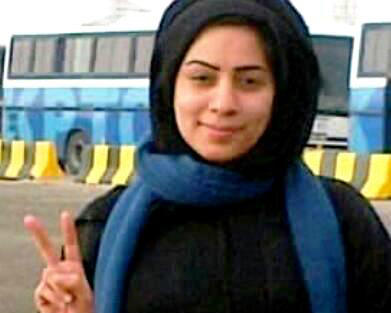
The Bahrain Center for Human Rights expresses its deep concern regarding judicial system, which lacks independence and fairness.
Siddiqa Al-Basri, (25 years old) a mother of two, was arrested from court on the 28th of January after she had her 6 months prison sentence upheld by the Court of Cassation for allegedly insulting a police officer and disobeying orders. Al-Basri was never presented with the opportunity to defend herself at any stage of the trial and appeal process.
During the state of martial law that was in place during April 2011, Al-Basri passed through a security checkpoint in her car where police officers inspected her and her car without justification or warrant. She was insulted, humiliated and mistreated by the officers. When she tried to leave the car and walk away, the officers pursued her, assaulted and finally arrested her on the charge of disobeying their orders and insulting the security forces for reportedly saying: “I’m from Sitra and I fear only God.”
Moreover Al-Basri was accused by the military prosecution of illegal gathering, causing a riot, and inciting hatred against regime at the same time. Her ID card was taken by police officers, and she was detained for ten days before she was released and referred to the military court (National Safety Court), which sentenced her on 21 June 2011 to two years of imprisonment in the second session of the trial. This sentence took place in the absence of a lawyer and without hearing her defence. She was released on bail of 200 Bahraini dinars pending appeal.
On 1 March 2012 the court of appeal denied Al-Basri’s right to present an appeal, and proceeded with passing a sentence of six months imprisonment. Her lawyer (Mohsin Al-Alawi) was denied requests to present his defence and question prosecution witnesses, such as the police officer who attacked her. Requests were also denied for the video recording from the Ministry of Interior’s security camera at the checkpoint.
The last hope for Al-Basri was the court of cassation, which has, unfortunately, upheld the sentence despite the blatant disregard for due process during the appeal trial. She was immediately rearrested from the court and is due to serve the next 5 months and 20 days in prison.
The Bahraini Constitution states in Article 20, that an accused person is innocent until proved guilty in a legal trial in which he is assured of the necessary guarantees to exercise the right of defence at all stages of the investigation and trial in accordance with the law.
The Bahrain Center for Human Rights calls on the US, UK, the UN and all other ally governments and international institutions to put pressure on the Government of Bahrain to:
– Immediatly release Siddiqa Al-Basri, review the court’s decision, and drop the politicaly motivated charges against her.
– Immediately suspend all politically motivated trials that are still ongoing for hundreds of the Bahraini people who are suspected of supporting or sympathizing with the uprising of February 14.
– Establish an independent judicial system, that is neutral and transparent and that ensures the conditions of a fair trial for all defendants according to international standards.
– Immediately hold accountable those responsible for corruption in the judiciary and in the provisions of unfair and unjust courts.
– Adhere to international and Bahraini law, which provides for the right of the accused to have fair litigation and an adequate defense.
– Enable lawyers to practice their work in defending the accused in the courts free of harassment and targeting. …more
February 1, 2013 Add Comments

